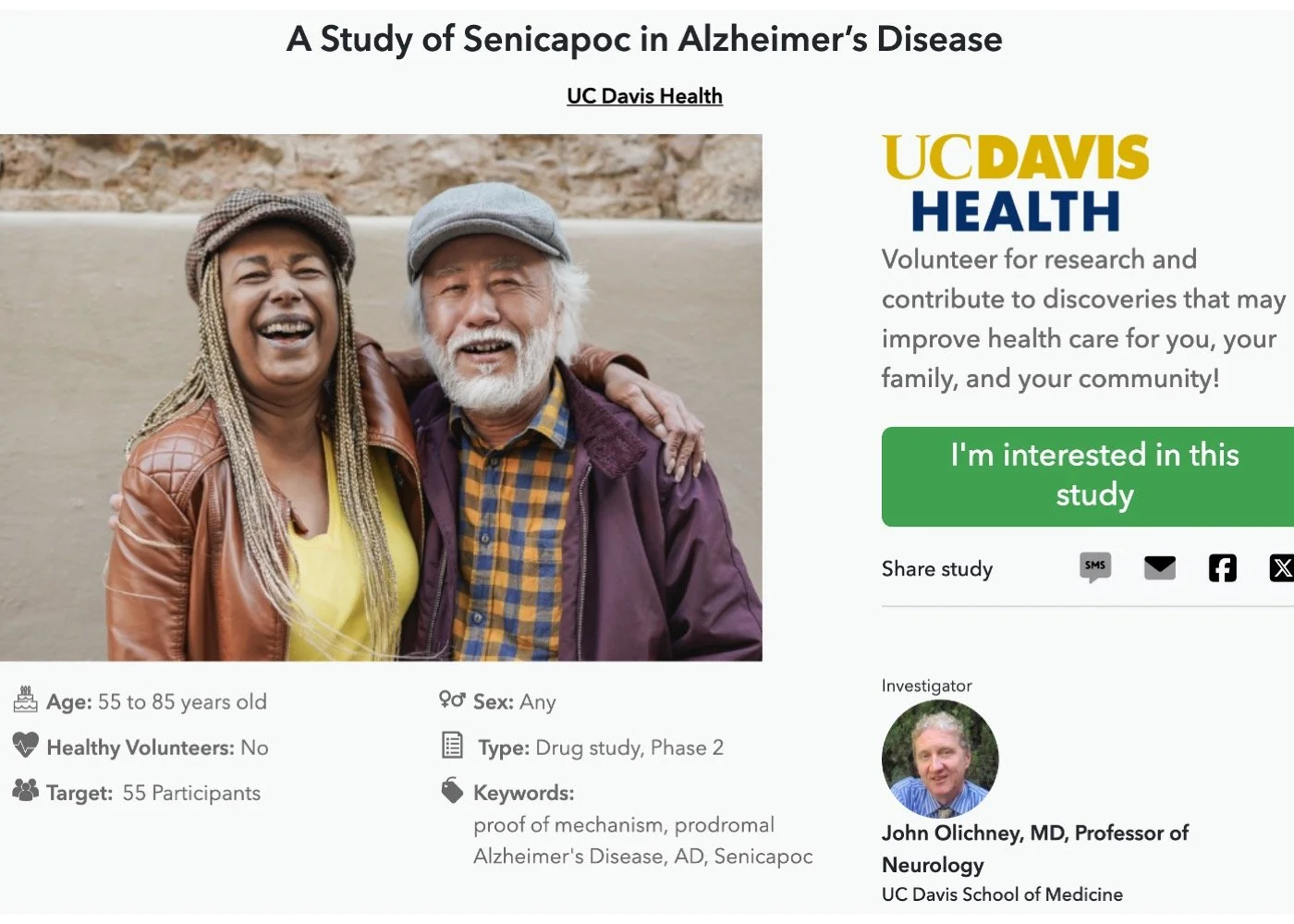UC Davis Alzheimer’s Disease Research Center Seeks to Understand, Slow, and Find a Cure for Alzheimer’s
Nearly every person reading this story knows someone—a relative or neighbor, co-worker or close friend—who is living with dementia, a general term for loss of memory, language, problem-solving, and other cognitive abilities that are severe enough to interfere with daily life. Alzheimer's disease is the most common cause of dementia and accounts for 60-80% of dementia cases.
There is no cure for Alzheimer’s disease, but there are medical treatments and lifestyle modifications that help to manage and slow the course of the disease in many patients. And, there is ongoing robust and hopeful clinical research being conducted every day by hundreds of researchers in medical and science communities across the country.
In Northern California, we’re fortunate to have two esteemed research centers at our doorstep: the UC Davis Alzheimer’s Disease Research Center in Sacramento and UC Davis Alzheimer’s Disease Research Center right here in Walnut Creek, in Shadelands, at 100 N. Wiget Lane.
UC Davis Alzheimer’s Disease Research Center in Shadelands is a powerhouse player—if hidden gem—in the world of Alzheimer’s diagnostic assessments, patient evaluations, progressive research, clinical trials, and patient care.
The Shadelands UC Davis Alzheimer’s Disease Research Center (ADRC), which relocated from Martinez in 2017, advances the understanding of Alzheimer’s disease and related dementias through ongoing and long-term clinical research into cognitive disorders and Alzheimer’s Disease. Clinical research includes both observational research—observing and studying volunteer participants—and clinical drug trials that incorporate study medications in the research with diagnosed patients. The Shadelands UC Davis ADRC is also a valuable resource for community outreach and education about the disease, providing support and counseling to patients and their families.
The 5,000-square-foot clinic is home to 20+ staff and medical professionals, three physical exam rooms, two neurological testing rooms, several shared offices, a processing lab, and a conference room.
“For observational research, we see people aged 65 and over who are generally healthy who want to be proactive about their brain health,” said Selene Carrillo, Clinical Research Coordinator for the Clinical Trials team. “Some participants want to contribute to the advancement of research, while others have a family history or concerns about their own memory changes and are interested in learning how to reduce the risk of developing Alzheimer's.
“In clinical trials, we see people aged 55 and over who represent a wide range of situations—from individuals with no diagnosis to those at increased risk of developing Alzheimer's due to family history, and those who have a diagnosis of Alzheimer's disease. In clinical trials, we are testing new medications and interventions, as well as methods to detect and diagnose Alzheimer's earlier.”
Doris Chen, MD, is a cognitive and behavioral neurologist who is both a researcher and a clinical physician who sees, treats, and prescribes for patients who have been diagnosed with Alzheimer’s. She is often called on to provide a second opinion, to review test results that have already been recorded, and to fine-tune recommendations the patient’s primary care provider or primary neurologist has already given.
“Observational research participants who are concerned about their own brain health get that one-on-one engagement with a sub-specialist and the chance to ask all those questions that can’t be answered by primary care providers,” said Dr. Chen. “Observational research participants can learn more about their own health with more in depth evaluations while contributing to medical research—that’s a huge driver for many of our participants.”
“We are desperately trying to understand this disease better, and one of the benefits of the intense, long-term observational studies is that we’re tracking people for many, many years, sometimes before they have symptoms,” said Nicole Alexander, the Shadelands UC Davis ADRC nurse practitioner who works solely in research. “We share this data in a national database with other ADRCs across the country in efforts to understand causes of memory changes. We don’t have a cure and we don’t have a single direct cause for Alzheimer’s, so being able to study participants and intervene earlier with advice based on observations benefits the participant and our research.”
“Our clinical trials, on the other hand, are looking at experimental therapies—medications and behavior modifications that have shown efficacy in previous early phase studies,” said Dr. Chen, who leads the Clinical Trials Unit. “Our clinical trials further test the effectiveness in individuals who have cognitive disorders with the hope that eventually, these medications are found successful and go to market. People diagnosed with Alzheimer’s disease often turn to a study medication after they have tried other avenues with other doctors and programs that aren’t working for them. A clinical trial can offer hope, options, and alternative pathways.”
“Now, in the middle of these two efforts—observational research and clinical trials—are imaging studies,” said Dr. Chen. “We’re looking at new imaging modalities and technologies that are incorporated into both observational research and clinical trials. Our work takes many shapes all in an effort to understand this disease, slow this disease, and find a cure for this disease.”
Shadelands UC Davis ADRC is currently recruiting for two clinical trials. One study is a UC Davis Phase II clinical drug trial lasting one and a half years testing to see if a study drug called Senicapoc can slow the progression of Alzheimer’s disease in people with a diagnosis of mild cognitive impairment or early Alzheimer’s Disease.
A second clinical trial is a brain health research study, the Alzheimer’s Disease Neuroimaging Initiative (ADNI), a five-year study looking to recruit diverse participants—healthy and impaired—involving cognitive tests, blood tests, and brain imaging.
People interested in the Senicapoc clinical drug trial or the ADNI4 research study can contact Selene Carrillo, 925.357.6914, [email protected].
People interested in learning more about observational research or how they can be seen at the Shadelands UC Davis ADRC for cognitive assessment can call the main number, 925.357.6515.
“With the advancements in Alzheimer’s diagnoses, medications, and treatments, we serve as professional resources in the community,” said Dr. Chen, “who can help guide the community and partner with our neighboring healthcare providers to appropriately use these medications and this research for the health and well-being of people living with cognitive disorders.”
Next month, we’ll meet Dr. Johanna Rengifo, an experienced (and Spanish bilingual) neuropsychologist who works at the Shadelands UC Davis ADRC solely on the clinical side, performing assessments of cognitive ability and helping people understand their symptoms and next steps.










